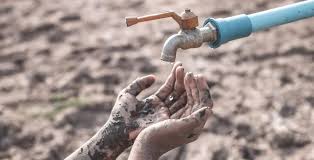In a world where access to safe drinking water remains a huge challenge, the new report by the United Nations Water Development that over 2 billion of the earth’s population lacks access to safe drinking water poses a new threat to global peace; BENJAMIN UMUTEME writes.
Access to clean water and sanitation is a basic human right. But it remains a challenge to billions of people globally, who still lack access to safe drinking water.
In spite of various efforts by governments across the globe to address the situation, climate change continues to pose a roadblock to making clean water accessible. All around us, we see the impact of climate change as we see places that were once wetlands gradually drying up.
Water Devt Report
And this was further laid bare by the UN World Water Development Report 2024. According to the report released recently, global water scarcity is not only fuelling more conflicts, it was also contributing to instability. The report noted that access to clean water is critical to promoting peace.
The UN body notes that 2.2 billion people worldwide have no access to clean water while 3.5 billion people lack access to safely managed sanitation. These alarming figures indicated a significant gap in achieving the UN goal of ensuring universal access to clean water and sanitation by 2030.
The report highlighted that conflicts over water resources were intensifying across the globe, necessitating immediate action to enhance international cooperation and establish trans-boundary agreements to maintain stability.
The report added that the impact of water scarcity extended beyond basic necessities, exacerbating food insecurity, health risks, and social disparities, particularly affecting girls and women who often bore the brunt of water scarcity’s consequences.
It added that water scarcity contributed to migration and displacement, further straining resources and exacerbating social tensions.
“Trans-boundary water management emerges as a critical strategy for mitigating conflicts and maintaining peace.
“Despite approximately 40 per cent of the global population residing in trans-boundary River and lake basins, only a fifth of countries have cross-border agreements to manage shared water resources equitably.
“Insufficient cooperation on trans-boundary water management exacerbates tensions, as observed in regions like the Sahel and the Arab world,” the report stated.
Shrinking Lake Chad
The lives of people and natural resources in northern Nigeria and the seven other African countries that rely on Lake Chad for survival are under serious threat as the climate change challenge facing the Lake
worsens.
The shrinking of Lake Chad, which provides food for over 40 million people in Nigeria, Cameroon, Niger and Chad and the disappearing natural resources of the water, has become a global calamity. This has
led to displacement of millions of families that have relied on the water body for the survival of their families. Today, Lake Chad is a living example of the devastation of climate change in Africa.
Once regarded as one of the largest water bodies in Africa, the Lake Chad is fast losing its traction. The water level and size has shrunk by a massive 90 per cent compared to what it was in the 1960s. Its surface area has decreased from a peak of 25,000 square kilometres to approximately 1,350 square kilometres.
Experts say there is already a 60 per cent decline in fish production, degradation of pasturelands, leading to shortage of dry matter estimated at 46.5 per cent in certain places in 2006, reduction in the
livestock population, and threat to biodiversity, Food and Agriculture.
This has driven the population around the Basin downwards towards the vegetative areas of the North Central and Southern part of the country.
Even the River Niger has not been spared in this onslaught. Experts have expressed worry over the continuous shrinkage of the River Niger, linking it to the impact of climate change.
Experts at the conference noted that for the first time since 1985, the River Niger completely dried up in Niamey, Niger Republic, due to climate change.
According to them, this has led to its reduction from two million Square kilometres to about 1.5 square Kilometres.
Climate change impact
The coordinator, Organization for the Sustenance of the Nigerian Environment (OSNE), Mrs. Angela Okoye–Kolawole, told Blueprint Weekend that the impact climate change has had on water bodies globally is steering everyone in the face.
While alluding to other man-made causes as being responsible for the present situation, the OSNE Coordinator said the situation has conflicts as people are forced to move to areas with water and vegetation.
“The Lake Chad Basin which was one of Africa’s largest freshwater bodies that provided livelihood to over 30 million inhabitants has been reduced to a minute fraction of its original size due to the impact of climate change and other man-made activities.
“This shrinking of the once lush basin has led to the displacement of people whose livelihood depended on the Chad Basin.
“The loss of vegetation that served as grazing points for herders has resulted in their southwards movement in search of pasture for their livestock. This without any doubt is the origin of numerous farmer-herders clashes that has become almost a daily occurrence in most countries and communities bordering the Chad Basin.
“The desperation for survival and sustenance, has transformed some of these herders into highly militarized syndicates, looking out only for their interest without regard to the harm done to others in the process,” she said.
In the same vein, a development researcher, Adefolarin Olamilekan, noted that the lack of a concerted effort by successive governments to address the water scarcity pushed the situation to what it is at the moment.
He said, “The UN Report is very instructive to our understanding of the crisis of the Lake Chad waters drying up and the consequences of its humanitarian concerns. However the turn of events within the Lake Chad basin is a global concern, it is also linked to issues of climate change.
“Unfortunately, over the years the government has not taken up the issue of water scarcity as a genuine humanitarian project to alleviate the suffering of millions of people in Nigeria. Interestingly, the report is a clarion call for collective action by the government, just as other reports in the past drew authorities attention to the plight of drying up Lake Chad basin,” he said.
Despite talks about replenishing Lake Chad, there has been no action to match words. A look at the countries that make up the Chad Basin shows that the replenishment talk might just be another talk shop.
According to UN data, the countries that surround the Lake Chad basin are often classified as Least Developed Countries (LDCs).
However, for the region there is a need to act swiftly.
Swift action
According to the Director General of UNESCO, Audrey Azoulay, “there is a need to act swiftly not only to safeguard water resources, but also enhance regional cooperation if we want to preserve peace.”
To reverse the situation, Okoye-Kolawole stressed the need for governments to put in concerted efforts aimed at tackling climate change globally.
According to her, the major factor causing the water crisis currently being faced globally is climate change.
“Employing water conservation technologies such as rain harvesting, irrigation etc especially for the rural population will enhance not only water security but also food security in the long run.
“Intensive awareness, sensitisation and enforcement by relevant government MDAs to ensure that the urban population use water responsibly should be embarked upon. Commercialization of urban water supply through effective metering should be considered by governments.
“Governments should be actively involved in the WASH sector, and ensure that water bodies that should serve as drinking sources for communities are not indiscriminately polluted.
“It is sad to note that most government and even donor interventions aimed at solving the water crisis have been reduced to drilling of boreholes. The proliferation of boreholes without a doubt may present its own challenges if left unchecked.
“There is an urgent need for the setting up of commercial grazing points for livestock (with support from the government). This will reduce the pressure on herders who in their desperation for pasture are constantly at war with farmers,” she added.
Adefolarin opines that there needs to be a deliberate action on the part of the government by appropriating funds into tackling the concrete water crisis such as building of water dams and reservoir tanks with easy pipe transportation.
He said, “Further, is tackling the challenge of the Lake Chad basin as a source of water in the northeast region. These demands re-channeling some water bodies to feed Lake Chad basin to revive and bring it back on stream, as well providing security for the people.
“Another is to improve public utility service delivery in potable drinking water to the people, as a measure to reduce the consequences of lack of water.
“We believe that with effective legislation, government and policy implementation we can achieve sustainable water provision for all Nigeria as well as bringing back Lake Chad basin back to its initial status quo.”




